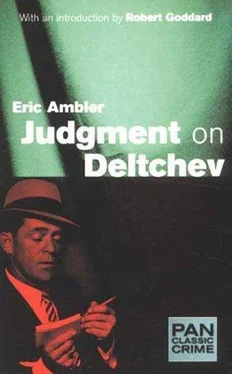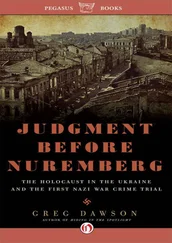Eric Ambler - Judgment on Deltchev
Здесь есть возможность читать онлайн «Eric Ambler - Judgment on Deltchev» весь текст электронной книги совершенно бесплатно (целиком полную версию без сокращений). В некоторых случаях можно слушать аудио, скачать через торрент в формате fb2 и присутствует краткое содержание. Год выпуска: 1977, ISBN: 1977, Издательство: Vintage, Жанр: Криминальный детектив, на английском языке. Описание произведения, (предисловие) а так же отзывы посетителей доступны на портале библиотеки ЛибКат.
- Название:Judgment on Deltchev
- Автор:
- Издательство:Vintage
- Жанр:
- Год:1977
- ISBN:9780307049971
- Рейтинг книги:4 / 5. Голосов: 1
-
Избранное:Добавить в избранное
- Отзывы:
-
Ваша оценка:
- 80
- 1
- 2
- 3
- 4
- 5
Judgment on Deltchev: краткое содержание, описание и аннотация
Предлагаем к чтению аннотацию, описание, краткое содержание или предисловие (зависит от того, что написал сам автор книги «Judgment on Deltchev»). Если вы не нашли необходимую информацию о книге — напишите в комментариях, мы постараемся отыскать её.
Judgment on Deltchev — читать онлайн бесплатно полную книгу (весь текст) целиком
Ниже представлен текст книги, разбитый по страницам. Система сохранения места последней прочитанной страницы, позволяет с удобством читать онлайн бесплатно книгу «Judgment on Deltchev», без необходимости каждый раз заново искать на чём Вы остановились. Поставьте закладку, и сможете в любой момент перейти на страницу, на которой закончили чтение.
Интервал:
Закладка:
Among the American and British correspondents Brankovitch was known as Creeping Jesus; he had a peculiar way of walking with his head and shoulders slightly in front of the rest of his body while his arms remained at a position of attention at his sides. By the French correspondents it was said that the posture was imposed upon him, as, in his imagination, Brankovitch carried two portfolios under his arms: that of his own ministry on one side and that of the head of the government on the other. He was a pale, dark man with a massive head and supercilious eyes. A graduate of Warsaw University, he had once been a mining engineer and his connection with politics had begun with pamphleteering. He had made a name for himself before the war as the arch-opponent of the foreign oil companies. He was a clever, ambitious man who never missed a chance of referring most emphatically to his loyalty to and admiration of Vukashin. They were many jokes made about these fulsome references to his leader; but it was said that, while he did not laugh at the jokes when they were reported to him, neither did he frown. It was believed that Vukashin disliked him personally but respected his judgment.
There were about sixty persons in the room; about half of us were foreigners. Brankovitch came in briskly, followed by two male secretaries bearing files and notebooks, and those who had been standing about talking took their seats. Brankovitch waited, looking round, until the movements had ceased. Then he began.
‘Gentlemen of the press,’ he said in German, ‘I have invited you to meet me here with three objects in mind. First, I wish to help you as far as possible in your work by giving you certain information necessary to your understanding of the evidence soon to be given in the criminal trial you are reporting. Next, I wish to give you an opportunity of asking me questions on matters of fact, and also’ — he smiled slightly — ‘on matters of opinion to which you may feel you already know the answers. Thirdly, I wished for the pleasure of renewing acquaintance with those of you I already know and of meeting those I don’t know. But business before pleasure, as the English say. I will speak briefly and then there will be time for questions.’
He glanced at his watch. He had a sort of brusque amiability that was not displeasing; he did not much care what we thought of him or mind if his amiability were not reciprocated. He was the busy man prepared to waste a little time on fools and so, logically, indifferent to foolishness.
‘Let me tell you,’ he said, ‘about the Officer Corps Brotherhood; not about its origins — I feel sure you know about those — but about its later activities and its methods. Terrorist societies are not recent institutions. Most countries have suffered from them. Many countries, including the United States of America, still do suffer from them occasionally. It is the duty of all civilized governments, when these occasions arise, to seek out and destroy the criminals. It is the duty, I say; yet, of course, the duty is not always performed. Sometimes the government is itself terrorized. In other cases the government may sympathize with the terrorists’ aims and secretly wish them well. I need hardly tell you that the Government of the People’s Party is neither intimidated by nor in any degree sympathetic to the Officer Corps Brotherhood. We will not tolerate crime of any sort. The workman who kills his mate in a moment of rage and the fanatic who kills his ideological enemy in cold blood shall have the same justice.’
‘From a People’s Court?’ somebody in the row behind me murmured; but if Brankovitch heard, he took no notice. He went on, ‘Under the reactionary governments of the pre-war years the Brotherhood became a great and terrible burden to our people. It is not known for certain how many murders it was responsible for. Without doubt the number must be reckoned in hundreds. I can tell you with more precision that the number of violent attacks on the person committed by the Brotherhood in the ten years between 1930 and 1940 was about one thousand four hundred. This figure includes only those cases serious enough to need hospital treatment. The reason for the greater precision is, of course, that those persons lived to explain what had happened. The injuries included bullet wounds — approximately six hundred cases; stabbings — approximately two hundred cases; acid-throwing — approximately thirty cases; flogging — approximately two hundred cases; and severe bruising and beating with truncheons, rods, and other weapons made up the remainder.’
He had been referring to notes in front of him. Now he pushed them aside.
‘But statistics can give little idea of the emotional consequences of this state of affairs, of the hatreds and fears aroused and of the effect on the social life of the community. I will tell you, therefore, of one typical case among the known cases and leave the rest to your imaginations. It is the case of Kyril Shatev, who was prefect to this city in 1940. A man named Brodno, a criminal pervert and a member of the Brotherhood, had been arrested on suspicion of murder. There was plenty of evidence on this occasion and Shatev determined to bring this man to trial. Immediately he began to receive the usual threats from the Brotherhood. He ignored them. I will be quite honest with you; past experience told him that when the case came for trial the attentions of the Brotherhood would turn from him to the judge trying the case. The judge might yield, but that was not Shatev’s business. However, he miscalculated. The probability is that the evidence against Brodno incriminated senior members of the Brotherhood and was for them too dangerous to be heard. The Sunday before the date of the trial was to be set, Shatev, with his wife, his two young children, and two female servants, was at his house about ten kilometres out of the city. They were about to sit down to the midday meal when a car drove up and three men got out. They said they wanted water for the car. A servant unthinkingly opened the outer door and the men pushed past her, knocking her senseless with a pistol butt. Then they went into the house. Shatev tried to defend his family and was immediately shot. Unfortunately for him, he did not die at once. The men had a bayonet, and the two children were killed with it. Shatev’s wife was then forced to witness her husband’s sexual mutilation, also with the bayonet. She was then killed herself. The other servant was not harmed. She was to serve as a witness, they said, that the sentence of the Brotherhood had been carried out. She was threatened, however, that if she attempted to identify the murderers she too would be killed. The murderers were never identified and Brodno was never tried.’
He paused for a moment and looked round. ‘One typical case,’ he said, and sighed. ‘No doubt,’ he went on, ‘much could be said about a government that allowed itself to be intimidated by such means, but it is easy to miss the point. There were, in fact, many members of the Brotherhood in government circles. This we have found out later, for, of course, membership was always secret. Who were these men? We know of two who were ministers and twenty-seven in posts of high authority in the civil service, the police, and the army. There were certainly others in these high places. The plain truth is that membership in the Brotherhood ran through every class of our society except that of the ordinary workman. This Brotherhood is a bourgeois disease. It is difficult to conceive, I grant you, that a man, presumably of more than average intelligence and ability, who has made his way to a position of authority and responsibility, could have any direct relationship with, for example, the murderous perverts who entered the Shatevs’ house that Sunday or with others equally vile. But we found it so. When, during the life of the Provisional Government, we began the attack upon this evil, we had many terrible surprises. Yes, I say, terrible . To despise a man politically is one thing. To discover that he is a criminal lunatic is another. It is difficult to believe the most incontrovertible evidence in such cases. Yet we must.’
Читать дальшеИнтервал:
Закладка:
Похожие книги на «Judgment on Deltchev»
Представляем Вашему вниманию похожие книги на «Judgment on Deltchev» списком для выбора. Мы отобрали схожую по названию и смыслу литературу в надежде предоставить читателям больше вариантов отыскать новые, интересные, ещё непрочитанные произведения.
Обсуждение, отзывы о книге «Judgment on Deltchev» и просто собственные мнения читателей. Оставьте ваши комментарии, напишите, что Вы думаете о произведении, его смысле или главных героях. Укажите что конкретно понравилось, а что нет, и почему Вы так считаете.












